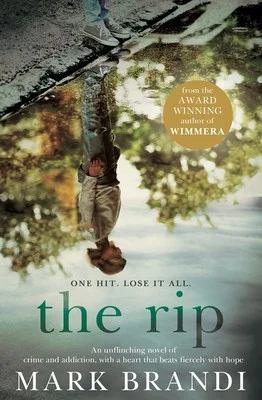Simon McDonald is convinced that under the hood of Mark Brandi’s novels thrums a noir engine.
Wimmera and The Rip — both intoxicating, unsettling masterpieces — feature characters plummeting inexorably towards obliteration, induced perhaps by events outside their control, but perpetuated by their own actions. One bad choice begets another in the hopes to solve or rectify the first. It starts as a gradual slide, then progresses into a nosedive from which there is no return. To use Otto Penzler’s words: the protagonists of Wimmera and The Rip are “entangled in the web of their own doom.”
We’re attracted to such stories because its human nature to ruminate on the bad decisions people make, and avow to avoid walking that same path. We witness their mistakes so we don’t have to make them ourselves.
Or so we hope.
With sparse, yet beautiful prose, Mark Brandi portrays destitution and addiction with neither voyeurism or judgement; instead he paints a devastating portrait of two people (and a dog) running the long marathon of struggle and survival on the streets of Melbourne. But on the streets, interpersonal relationships are just as likely to open you up to salvation as damnation. Which is precisely the case when Anton — our narrator’s companion — welcomes Steve into their lives.
Sure, Steve’s got an apartment they can crash in, and he’s got access to drugs; but there’s something wrong with the guy. Prone to fits of violence, not to mention the strong smell — like vinegar, but stronger — wafting from behind his padlocked door. Staying in this apartment, with a temperamental stranger for a flatmate, and Anton forced back into a life of crime to maintain the creature comforts of their new home, is a gamble; if it doesn’t pay off, the consequences are catastrophic. But when the alternative is life back on the streets, maybe it’s worth it; maybe it’s acceptable to close your eyes to the incongruities of the apartment, and Steve’s violent tendencies, and just accept and enjoy the daily hit that briefly whitewashes reality. When you can’t afford your next meal, can you really afford to take the moral high ground?
This is a story of real life: of human frailties and violence. It is chilling and completely credible as it speeds towards a dark inevitability. It is an incredible step forward for a writer of commanding gifts, who seems poised on the threshold of even greater accomplishment.



